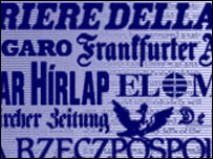
France's Liberation labels as "pointless" the bill by the French lower house making it a crime to deny that Turks committed genocide against the Armenians in 1915.
"The destruction of the Armenian people of Asia Minor... is an historical fact which it is hard to deny", it says, even if some challenge the term "genocide".
But the new law, it contends, "contributes to the dogmatisation of historical research, the best example of which can be found in Turkey".
There, merely speaking of genocide can lead to prosecution and this law will hinder the very people who are seeking progress in this area, it says.
But Austria's Der Standard backs the bill.
The paper acknowledges that the vote may be the result of "consideration for the 450,000 French-Armenians in the country".
But it argues that the killings seem to meet the genocide criteria laid down in United Nations conventions.
"This is why the bill passed by the Paris MPs is to be approved of, even though it may be based on petty electoral considerations," the paper says.
Fellow Austrian daily Die Presse disagrees.
The paper feels it "borders on the absurd" that France may make the denial of Armenian genocide punishable by imprisonment while in Turkey prison looms for those who say genocide occurred.
"How can there be an open, scholarly discussion if this can land you in prison in two countries?" it asks.
Where East meets West
Spain's El Pais carries a front-page photo of the Turkish writer Orhan Pamuk wearing a broad smile after hearing yesterday that he had won the Nobel prize for literature.
"I am a writer who explores two worlds," it quotes him as saying; "my cultural references come from the East and the West."
In an editorial, the paper says Mr Pamuk has not only shown himself to be a narrative genius.
"Pamuk could also have received the Nobel peace prize," it argues. "He is one of the intellectuals who has reflected with the greatest brilliance... on the depravity of national, ethnic or religious fanaticism."
Germany's Frankfurter Allgemeine Zeitung says awarding the prize to Mr Pamuk is "the best decision the Nobel prize committee has taken for years".
The paper compares the award to that of the Nobel literature prize to Soviet dissident Aleksandr Solzhenitsyn in 1970.
"Then the dominant global issue was a bipolar ideological conflict," it says; "now the world has entered into a period in which the issue of religious cultural wars is dominant."
The Czech daily Hospodarske Noviny, however, questions the judges' motives.
"The Nobel prize for literature for a writer who was charged in Turkey last year for daring to speak aloud about the Armenian genocide and massacres of Kurds has a strong political aspect", it says.
"Pamuk's literary qualities are unquestionable," the paper admits, "but the Nobel prize committee's decision this year was more political than literary."
New prospects?
Russian papers have mixed views on the results of President Putin's visit to Germany this week.
"Vladimir Putin's visit to Germany opened new prospects for cooperation with both Germany and the whole of Europe... The Germans, it seems, are changing their mind about Russia," says the Moskovskiye Novosti.
But others papers are not so sure.
"It would be an exaggeration to describe the October wind which blew in Dresden and Munich as cold. It does look, however, that the external temperature of Russian-German relations did somewhat go down," says Nezavisimaya Gazeta.
The paper adds that Mr Putin's visit was "unlike any of his earlier visits in its emotional intensity and criticism in German political circles."
A commentary in business broadsheet Kommersant notes with some concern that France and Germany on Thursday again urged Russia to ratify an international energy charter, a move which would give the EU greater security for its energy supplies.
"Germany and France are demanding that Russia abide by Europe's energy rules," the paper says, and its assessment of the position is that the "likelihood of Russia and the EU agreeing in Berlin to set up an 'energy axis' is almost zero."
Germany's Sueddeutsche Zeitung says it would be a "fundamental mistake" for the government to buy a stake in the parent company of Airbus, Eads.
The paper says the state is considering such a move in order to safeguard its interests in the aircraft manufacturer.
But it believes the fact that Airbus is in the "deepest crisis in its history" is the result of too much state influence rather than too little.
"What a topsy-turvy world: while Russian President Vladimir Putin conjures up capitalism... his western European colleagues discover the planned economy," it says.
Germany's Der Tagesspiegel says a government stake in Eads can only be a "temporary solution".
The paper acknowledges that the "success story" of European aircraft manufacturing would have been impossible without massive state aid, but it adds that this cannot go on for ever.
"No, at some point this bird will have to fly unaided, otherwise its existence would not be justified," it says.
The European press review is compiled by BBC Monitoring from internet editions of the main European newspapers and some early printed editions.














